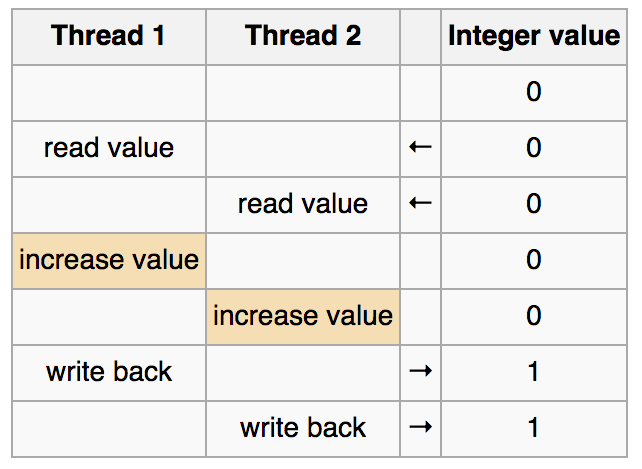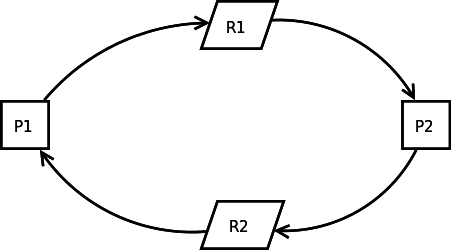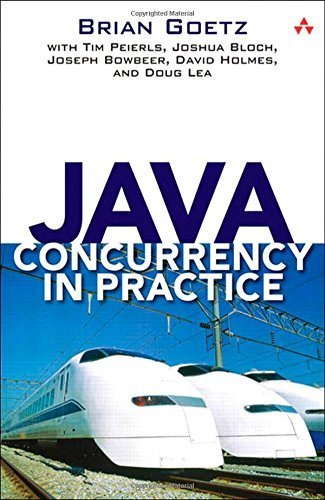Modern Java Concurrency
Adam Retter
Evolved Binary Ltd
@adamretter / adam.retter@googlemail.com
Adam Retter
-
First and foremost... I am very under prepared!
-
Consultant
-
Scala
-
Java
-
XQuery, XSLT
-
-
Open Source Hacker
-
Predominantly NoSQL Database Internals
-
e.g. eXist, RocksDB, Shadoop (Scala Hadoop M/R framework)
-
-
W3C Invited Expert for XQuery WG
-
Author of "eXist" book for O'Reilly
-
...Recently moved to Bristol!
What I want to talk about...
-
Kind of a whirlwind tour...
-
May introduce many concepts and topics
-
Little detail... lots for you to research later
-
Scare you with JVM and Java SE concurrency
-
Calm you with other concurrency options
-
-
Concurrency Fundamentals
-
Concurrency on the JVM
-
Modern Java SE Concurrency
-
Better Concurrency Options
My Java Concurrency Journey
-
Do some basic multi-threaded stuff
-
Appears to work
-
Think concurrency is simple ☺
-
-
Hear other people complaining concurrency is hard
-
Don't really believe them
-
TMy experience was positive... I must know more!?!
-
Blissful ignorance ☺☺
-
-
Fix some deadlock/livelock bugs
-
Feel like a concurrency ninja ☺☺☺
-
My Java Concurrency Journey
-
Learn and read more about Java Concurrency in depth
-
The less we feel we know ☹
-
The more insecure we feel ☹☹
-
Concurrency is hard! ☹☹☹
-
-
Search for higher level abstractions ☯
-
Feel much happier
-
Be more productive
-
Do not be ignorant of the hard stuff!
-
Concurrency Principles
-
What is concurrency?
-
Several computations are executing simultaneously
-
...and possibly interacting with each other!
-
Concurrency Principles
-
Why do we need concurrency?
-
CPU Clock Speeds are not increasing
-
Often decreasing to save power!
-
Many small cores
-
-
Need to make use of many compute cores
-
Project Sumatra - GPU from Java
-
Sparc T-5, / Tilera / Azul Vega 3 / Compute clouds etc
-
-
Not linear speed, rather throughput
-
Not just speed but also isolation and containment
-
Concurrency Principles
-
Why do we need concurrency?
-
CPU Clock Speeds are not increasing
-
Often decreasing to save power!
-
Many small cores
-
-
Need to make use of many compute cores
-
Tilera (64 cores)
-
Oracle Sparc T-5 (128 cores)
-
Azul Vega 3 (864 cores)
-
Project Sumatra - GPU from Java
-
Compute clouds etc
-
-
Not linear speed, rather throughput
-
Not just speed... also isolation and containment
-
Concurrency Primitives
-
Process vs. Thread
-
Processes
-
Managed by the OS
-
Own resources (file handles, memory, etc)
-
Have their own address space
-
e.g. Java
-
-
Threads
-
Within a process
-
Lightweight compared to process
-
-
Thread Safety
https://docs.oracle.com/cd/E26502_01/html/E35303/compat-14994.html
Is Concurrency Simple?
-
Executing independent Tasks is simple
-
Parallel decomposition of existing linear workloads is hard
-
Mutable shared state is hard
-
Task/Data access coordination is hard
-
Consistency vs Eventual Consistency
-
Most likely requires synchronisation
-
Synchronisation
-
Critical Section
-
Code that accesses a shared resource that must not be concurrently accessed by more than one thread
-
Requires synchronising thread access!
-
-
Mutual Exclusion
-
Only 1 process concurrently within the same critical section
-
Semaphore, Binary or Counting
-
Mutex, has an owner
-
Lock / Spinlock / Reentrant lock / Readers-writers lock
-
Synchronisation Issues
-
Caused by interleaved access from multiple threads
-
Issues may rarely manifest themselves
-
When they do manifest, typically under worst conditions
i.e. heavy production load
Race Condition
-
Caused by a lack of correct synchronisation
-
2+ threads dependant on a mutable resource
-
The result is sometimes not as expected
Consider the function:
private int value = 0;
public int getNext() {
return value++;
}
Race Condition
A: No! Because.... value++
-
Not an atomic operation!
-
Sugar for 3 operations:
get,addandset

Deadlock
-
2+ threads holding and trying to acquire opposing locks
-
Cyclic locking dependency between threads
-
Directed graph: Nodes are threads, Edges are access relationship
-
Consider the functions:
public void leftRight() {
synchronized (left) {
synchronized (right) {
doSomething();
}
}
}
public void rightLeft() {
synchronized (right) {
synchronized (left) {
doSomethingElse();
}
}
}Deadlock
-
Q: No! Deadlock prone!
-
Tools/Solutions
-
Open Calls
-
Calling an (object) method with no locks held
-
Can help by encapsulating locking
-
-
Lock ordering
-
Deadlock detection, abort one thread (and retry?)
-

Livelock
-
Often comes from overeager error-recovery code
-
Mistakes Unrecoverable error as Recoverable and retries
-
-
Two threads change their state in response to each other
-
e.g. Two polite people walking down a hallway, try to get out of each others way...and again... and again...
-
Can be mitigated by introducing some entropy into the action or delay
-
Concurrency on the JVM
-
java.lang.Runnable-
Something that can be executed
-
Possibly in a Thread
-
-
Threads
-
java.lang.Thread(now) mapped to OS/Kernel threads
Daemon or Non-Daemon (user) threads
-
java.lang.ThreadGroup
-
Synchronisation in Java SE
-
Explicit
-
java.util.concurrent.locks-
ReentrantLock
-
ReentrantReadWriteLock
-
Supports downgrading
-
Manual lock upgrading is deadlock prone!
-
-
StampedLock (Java 8), Not Reentrant!
-
-
Synchronisation in Java SE
-
Implicit
-
synchronizedkeyword
-
Used on methods, acquires the objects intrinsic lock
public synchronized setValue(final int value)
-
On referenced object, acquires intrinsic lock on specified object
synchronized(thing){ ... }
-
Is Reentrant!
-
-
Do you really understand Java Concurrency?
-
What does the
volatilekeyword do? -
What issues may occur with escaping references in constructors?
-
What is the JMM (Java Memory Model)?
Why is it important for concurrency?
Why did it change for Java 1.5?
Java Concurrency Bible

Modern Java SE Concurrency (1.5)
-
JSR-133 Java Memory Model and Thread Specification Revision
-
Corrected and formalized the operation of synchronized and volatile
-
Detailed how immutable objects work with multithreading
-
Thread-safe provided that references aren't allowed to "escape" while the constructor is being executed
-
-
Enabled non-blocking coordination among threads through the use of
volatile.
-
Modern Java SE Concurrency (1.5)
-
Callable and Future
-
Only really small improvements over
java.lang.Runnable -
Win! Can obtain result from asynchronous computation without shared mutable state
-
Easier to coordinate Threads and their lifetimes
-
-
java.util.concurrent.Callable-
Similar to
java.lang.Runnable, but...-
allows you to return a result
-
allows you to throw a checked Exception
-
-
Modern Java SE Concurrency (1.5)
-
java.util.concurrent.Future-
The result of an asynchronous computation
-
e.g. At some point in the future there MAY be a result
-
-
ExecutionExceptionwraps possible checked exception of Callable -
Also provides synchronous (blocking) mechanism for getting result
-
-
java.util.concurrent.ExecutorService-
The glue between Callable and Future
-
Submit a Callable to an ExecutorService and you are given a Future
-
Java 1.5 SE Concurrency
-
java.util.concurrent.atomic-
Lock-free
-
Thread-safe
-
Uses the CPUs CAS (Compare and Swap/Set) instructions
-
Provides atomic conditional update of a value/reference
-
import java.util.concurrent.atomic.AtomicInteger;
private AtomicInteger value = new AtomicInteger();
public int getNext() {
return value.getAndIncrement();
}
Java 7 SE Concurrency
-
Fork/Join framework-
The new old stuff!
-
i.e. really just an
ExecutorServiceplus some glitter
-
-
TODO What sort of parallelism approach does this provide?
-
TODO Examples...
-
Java 8 SE Concurrency
-
java.util.streams-
Collection.parallelStream -
A different approach to parallelism, i.e. SIMD approach
-
Inspired by Scala's Parallel Collections???
-
TODO discuss issues around ordering and side-effects...
-
TODO Examples...
-
-
java.util.concurrent-
CompletableFuture
-
CompletionStage
-
TODO Examples...
-
So, is Java Concurrency Easy?
-
Mutable shared state is the real issue!
-
(Correct) synchronised access is really hard!
-
Threads and Locks are your primitives!
-
Sadly,
CallableandFutureoffer little more
-
-
Atomics are very helpful... but limited by types
-
TODO check --> Fork/Join does not help with shared state!
-
java.util.streamscan help with SIMD like parallel processing of data
Dreaming of an Easier Life
-
Higher-level abstractions
-
Containment of Shared State
-
Correct protected access to Mutable Shared State
-
Concurrency where deadlocks are impossible
Actually, why should I even have to care about locks?
-
I want to: focus on what rather than how!
Along Came "Reactive"...
-
It's a Philosophy towards how you compose both your application and larger systems
-
Ah! We are going to need more asynchronous concurrency :-/
Reactive
-
Responsive
-
Resilient
-
Elastic
-
Message Driven
p.s. The "Principles of Reactive Programming" online course with Coursera starts again on April 13th 2015
- https://www.coursera.org/course/reactive
Modern Java Concurrency
So, if we have to do concurrency, what better options exist?
-
ReactiveX
-
Based on Observables
-
Like Iterators but for Concurrency
-
-
Akka
-
Based on Actors
-
-
TODO others?
Modern Java Concurrency
By Adam Retter
Modern Java Concurrency
Talk given at Bristol Java Meetup 10 March 2015
- 5,083


